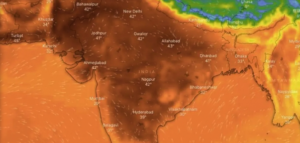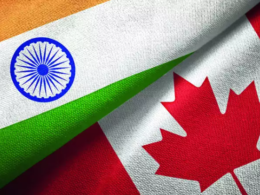Warnings of heat waves issued all over the country as record claiming 2024 the hottest summer like never before.
‘2024’ is the year when India witnessed a deadly unbearable heatwave throughout the country like never before, which was responsible for taking numerous lives across different states, not only humans were affected by it, but also the animal habitat was disturbed and significantly threatened by this scorching humid weather.
 We as humans need to understand that we are going through a climate emergency, and this situation at any cost can not be taken for granted. Mostly the affected regions are the northern parts of the country.
We as humans need to understand that we are going through a climate emergency, and this situation at any cost can not be taken for granted. Mostly the affected regions are the northern parts of the country.
As a study suggests, conducted in 2021, predicted in the upcoming years India will face extreme heatwaves from April to June, and the northern, eastern, and western parts will mostly be affected and the intensity of heat will increase over the years.
What is a Heatwave and how does it form?
Heat wave is a climate condition unlike any weather that runs on a cyclic turn. In simple terms it’s a trap of high pressure in an area’s atmosphere.
When the upper atmosphere’s heat is unable to flow due to the lack of winds and gets deflected towards the ground for the very same reason the heat reflected from the ground is trapped and unable to flow resulting in the formation of heat waves.
Reasons for this hike in temperature
- Global Warming: Deforestation which has led to the increase level of greenhouse gases.
- Poor Urban Planning: It’s the building of concrete housing complexes without proper counting of the trees that are being cut for urbanization and not having a plan to repant them for maintaning a balance.
- Excessive carbon emission: If we think the air conditioner is our answer against this scorching heat, then this might be the most irresponsible response as human beings. AC is responsible for humid temperatures as the electricity in India is mostly generated from thermal power by burning coal and this results in excessive carbon emission which pollutes the air quality.
How can we survive this Heat wave condition in India?
Urban cities must introspect their development plans and schemes on the basis of improving the air quality and making clean walking places with good volume of trees that would lower the heat and would strike a balance of the greenhouse gases in the air.
The government should bring bills or rather insist people through laws so that they would opt for more electric vehicles rather than buying cars that runs on petrol or diesel.
We can create terrace garden that would help to lower down the usage of air conditioners, plant trees on roadsides to keep the pressure low, and an alternative could be designing a good ventilation system in a house that will be feasible and would maintain lower temperature at home.
Promote the use of solar panels at homes and lower down the electric usage for various purposes. Through these minimal steps we can hopefully create an environment to live a healthy life with less thought about tackling heat.
Disclaimer: This content is for educational purposes only. Consult an expert opinion for further details.
Thanks for reading! Keep exploring alloftop.com for the latest in tech, science, business, lifestyle, and beyond. Stay informed with us, and always be ahead of the curve!











